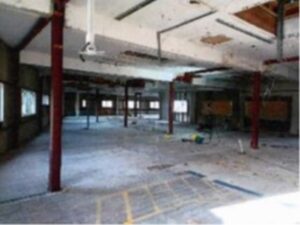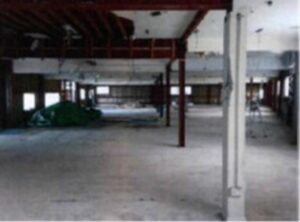A company director has been jailed for eight months after failing to protect workers from exposure to asbestos at a student development project in Winchester.
Stephen Davies, 59, had set up Cavendish Winchester Ltd with the sole purpose of refurbishing the Winnall Close commercial unit into student rental accommodation. His co-director Neil Bolton, 56, was spared an immediate spell behind bars when he was handed a four-month suspended sentence at Southampton Crown Court on 27 March 2024. The company itself was fined £30,000 – with all three defendants pleading guilty.
An investigation by the Health and Safety Executive (HSE) revealed the company removed an estimated ten tonnes of asbestos insulating board (AIB) during the refurbishment in late 2019 and early 2020. The dangerous materials were stripped out by workers unqualified to do the job and unaware of the risks to their health.

- The issue of asbestos more widely, and improving knowledge of the dangers, is the focus of two HSE campaigns. Guidance on asbestos safetyhas recently been updated and the current Asbestos: Your Duty campaign aims to improve understanding of what the legal duty to manage asbestos involves.
The investigation arose when HSE received a concern that large quantities of AIB had been illegally removed. The work was all carried out under the direction of Stephen Davies.
The court was told both directors were aware of the considerable extent and quantity of the materials containing asbestos within the building, as they had previously sought legitimate quotes for its competent removal.
However, they chose to save a considerable sum of money by avoiding properly planned, safe removal, by a Licenced Asbestos Removal Contractor. They knowingly exposed workers to significant risk to their health. In addition, the investigation was unable to determine where a very sizeable quantity of asbestos-contaminated debris ended up, such that others in the waste removal chain were likely to have been put at risk too.
All three defendants pleaded guilty to charges relating to a lack of adequate management of the removal of asbestos containing materials.


Both Stephen Davies and Neil Bolton pleaded guilty to Section 37 of the Health and Safety at Work etc Act 1974, by causing their company, The Cavendish Winchester Ltd, to breach Section 4(1) of the Act.
- Davies, of Petworth, West Sussex was given an immediate custodial sentence of 8 months in prison.
- Bolton, of Petworth, West Sussex was given a custodial sentence of four months, suspended for 12 month, with 250 hours of unpaid work and ordered to pay costs of over £5,123.
- The Cavendish Winchester Ltd, of Newtown House, Liphook, was fined £30,000.00.
Speaking after the hearing, HSE principal inspector Steve Hull said: “We brought this case because, despite the directors of this company being put on notice of the risks involved, they put profit before the health of those they employed.
“The dangers to health associated with exposure to asbestos fibres are well known and a wealth of advice and guidance is freely available from HSE and other organisations.
“Structural refurbishment which either exposes or is liable to expose people to asbestos fibres should only be carried out by competent persons working to a strict plan of work to ensure safety. Higher risk asbestos removal, such as the removal of AIB, can only legally be carried out by Licenced Asbestos Removal Contractors who have the knowledge and equipment to prevent the spread of fibres and properly protect the workers undertaking the removal work.
“This work involved the removal of an estimated ten tonnes of AIB.
“The defendants then tried to cover their tracks by legitimising the removal of a small amount of residual asbestos containing materials, after illegally stripping out the majority, by obtaining a new quote for legal removal of that very small remaining portion. This deliberate attempt to save money, when they knew full well that the workers would have to live with the possibility of developing serious asbestos-related disease in the future, makes the case particularly serious.”
This case was brought by HSE enforcement lawyer Kate Harney, who was supported by Paralegal Officer Helen Jacob
Notes to editors
- The Health and Safety Executive (HSE) is Britain’s national regulator for workplace health and safety. We prevent work-related death, injury and ill health through regulatory actions that range from influencing behaviours across whole industry sectors through to targeted interventions on individual businesses. These activities are supported by globally recognised scientific expertise.
- More information about the legislation referred to in this case is available.
- Further details on the latest HSE news releases is available.
- HSE has recently updated its guidance on asbestos safety and has just launched its Asbestos: Your Duty campaign that aims to improve understanding of what the legal duty to manage asbestos involves.
Follow this news feed: HSE





